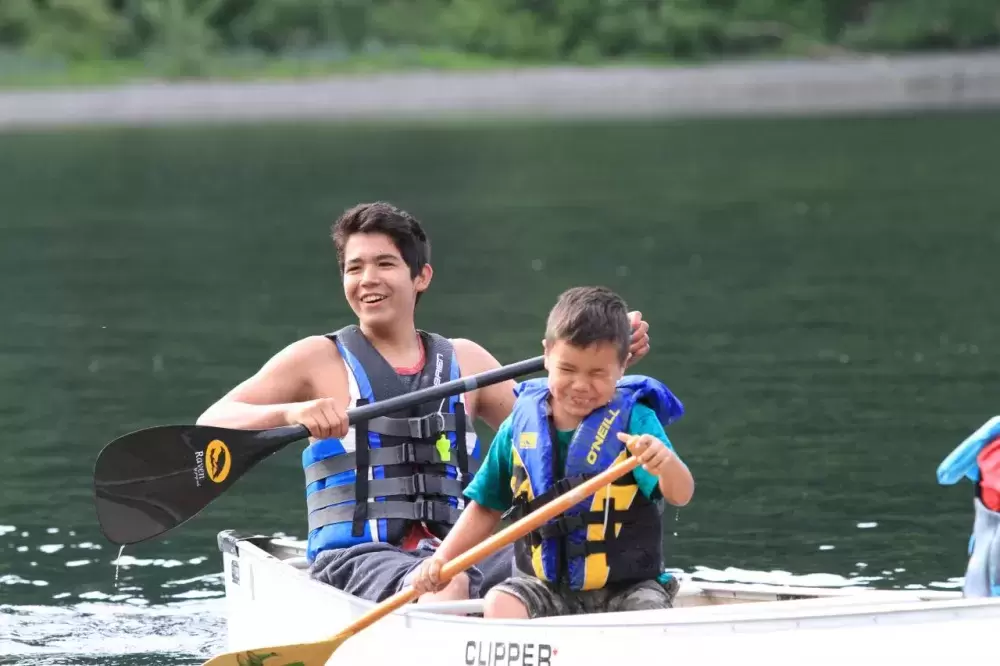Along with other paddlers from the Ditidaht Community School, 11-year-old Mazzari Tate begins his day on the water.
“I usually wake up at 6:30, maybe a little bit before, and I have to be at the school by 6:45,” said Tate of the pre-paddling ritual that characterizes his mornings from Monday to Wednesday each week. “I like being on the water because it’s calm.”
Tate lives on the Ditidaht reserve in Malachan, a village of less than 200 that, despite its small population, has gained a reputation for raising formidable paddlers. The 11-year-old is currently honing his skills for the North American Indigenous Games in Toronto this July, where he will be joined by fellow Ditidaht paddlers Quentin Tate, Dylan Marchand and Krissi Edgar.
The youngsters paddle alone in canoes, doing six laps around fish pens on the calm morning water of Nitnaht Lake.
“They’re averaging about three minutes per lap, so they could do 3K in under 18 minutes,” said Peter Amos, who coaches paddling at the Ditidaht school. “That would be a goal at the previous NAIG games. But with the evolution of canoeing - kids are getting bigger these days - I kind of give them a goal and get them to break that goal.”
But on June 7 and 8 the Ditidaht paddlers had others join them in the canoes for the community’s sixth annual Paddle Days, with ages ranging from 5 to 17. The event began as an initiative from the Truth and Reconciliation Commission to help restore canoe skills among Nuu-chah-nulth-aht on the west coast. Paddle Days has since grown into an opportunity for the Ditidaht to share their competitive spirit and cultural vitality, welcoming other schools to participate in the two days of activities on and off the water. This year saw participation from Haahuupayak school, Pacheedaht and the Saturna Island Ecological Education Centre, a school that draws students from the Lower Mainland, Vancouver Island and the Gulf Islands to board during the week.
“Everyone will go home with a medal,” said Amos of Paddle Days, adding that the event fosters a “feeling that being on the water and connected to the water is a way of life for Nuu-chah-nulth on the west coast.”
After the paddling cultural events followed at the Ditidaht school, including performances from the hosts and their guests.
This is the third year the Saturna school ventured to Ditidaht for Paddle Days.
“The culture, the stories, paddle races, meeting new people…to travel to a reserve and visit people who are living there, it’s something that a lot of us haven’t done before,” said Saturna teacher Dorianna Chessa.
Activities began on June 7 with an opening proudly performed by Ditidaht students, including a ciiqaa (prayer song), Flag Dance and Paddle Dance that belong to Hereditary Chief Paul Tate.
“He lets the kids use it and learn it at the school,” said Cyril Edgar, who teaches in the Ditidaht School’s language and culture program. “We use the Paddle Dance to open up Paddle Day and welcome everybody. Everybody can have a good time, have a lot of fun and enjoy themselves.”
From the time he was in the cradle Edgar learned to sing from his late father, Ernie Chester. Now he helps to pass this tradition in Ditidaht youngsters as they learn to carry song.
“I used to just sing and drum with them all of the time,” said Edgar. “This year I kind of put the drum down, and every once in while when I’m singing I just stop. It helps them to continue and carry on singing without me because they’ve always relied on me to sing the song with them the whole time.”
Edgar noted the importance of teaching protocol to his students.
“You can’t just pick up any song without permission,” he said. “We also want to instill pride in them. Let them be very proud of who they are, where they come from, how to treat our guests with respect and treat each other with respect - treat the land with respect and the water with respect.”







